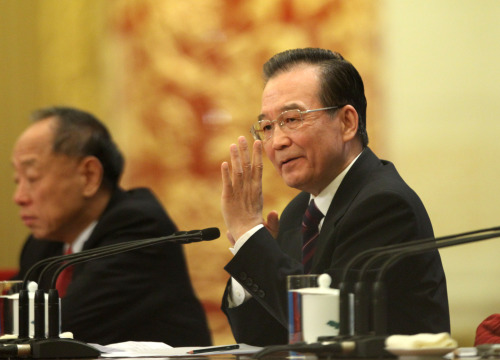 |
Chinese Premier Wen Jiabao (Xinhua-Yonhap News) |
BEIJING (AP) ― China’s legislature approved revisions Wednesday to a key criminal law that at least on paper will restrict police powers to secretly detain people, a tactic increasingly used against activists and government critics.
The changes to the criminal procedure law were the most high-profile ones passed on the last day of the annual National People’s Congress. The Communist Party-controlled body also approved a budget for this year that calls for a boost in domestic consumption to keep the economy expanding while overseas markets remain weak.
While legal reformers have mostly applauded the revisions to detention rules, saying they will offer better protection of suspects and reflect increasing awareness in China of the need for stronger detainee rights, legal enforcement in China is another matter.
Police and prosecutors routinely ignore current legal provisions protecting suspects’ rights and have frequently used charges of endangering national security against dissidents.
The revision is seen as an incremental move and is not seen as leading to major changes in China’s authoritarian one-party system, despite occasional calls for political reform.
At his annual news conference Wednesday following the session’s close, Premier Wen Jiabao repeated vague reform calls, saying they were needed to solidify the achievements of three decades of economic growth and prevent a repeat of the chaos that rocked China during the violent 1966-1976 Cultural Revolution.
“I know very well that the reform will not be an easy one. The reform will not be able to succeed without the consciousness, the support, the enthusiasm and creativity of our people,” Wen said.
As before, Wen offered no specific proposals, saying reform had to adhere to China’s particular national circumstances and proceed in a “step-by-step manner.’’ Chinese leaders often define political reform in terms of boosting administrative efficiency, but even those paltry efforts at streamlining have gained little traction against an entrenched bureaucracy and struggle for influence ahead of this fall’s generational leadership transition.
The approval of the revised law by a vote of 2,639 to 160 ends months of speculation and debate about whether the government would give police the legal authority to do something they have long done extralegally: disappear people for months at a time without telling their families.
Police have increasingly used the tactic over the past year to detain activist lawyers, democracy campaigners, and even internationally acclaimed artist Ai Weiwei, amid government worries about whether the popular uprisings of the Arab Spring might spread to China.
There are two relevant articles in the new law that deal with notifying families, one in regular criminal cases and the other involving a type of detention known as residential surveillance. Both have been revised to better protect detainees, though they don’t do away completely with secret detentions, analysts said.
In the case of residential surveillance, a sort of house arrest that can happen in a fixed location that is chosen by police, a detainee’s family must be notified within 24 hours unless they can’t be reached. Dissidents detained under this kind of residential surveillance are often put in suburban hotels or apartments, and many have reported being tortured by police.
The congress also approved a budget for this year that calls for a boost in domestic consumption to keep the economy expanding while overseas markets remain weak. The budget also pledges greater support for social security, employment and public housing to help those left behind by the nation’s economic boom.
The government plans growth of 7.5 percent this year _ a target below previous goals as it seeks a slightly slower pace of expansion while trying to rebalance the world’s second-largest economy.
China has produced three decades of rapid growth primarily through exports, but the sluggish world economy and rising wages within China raise questions about how long that can continue. The World Bank said recently that the economic strategy is unsustainable. The bank issued a report with a Chinese Cabinet think tank that called for more free-market reforms.
This year’s 10-day congress was held not only amid economic concerns but also amid jockeying for power ahead of this fall’s Communist Party congress at which President Hu Jintao and the most senior party leaders begin stepping aside after a decade in power to make way for a younger generation.








